I’ve been thinking about this post for a while now. I kept notes in my phone trying to write down small mementos I wanted to share. How could I possibly capture everything in one place? How could I possibly do my time in Bangladesh justice? It’s been difficult for me to convey my feelings with words but here goes-
In my previous post when describing Bangladesh as a “developing” country, I wrote, “I feel “developing” is a misnomer; it’s not the people but the systems that need development. The resilience of the Bangladeshi people is inspiring.” I had no idea the weight this would hold in the coming days.
Part I:
My practicum with Ipas Bangladesh was everything I could have hoped for and more. Working in an organization dedicated to improving sexual and reproductive health rights (SRHR) made me proud. In talking with my preceptor and other staff members, I would often share how much I loved the fact that public health work translates across the globe. We may have different backgrounds, speak different languages, eat different foods (holy spice), but we always share a common understanding and passion for ensuring people have access to services they deserve. It’s their right. Speaking of my preceptor, this was a note I kept in my phone following one of our many meetings:
“He is an angel of a human. He’d probably be embarrassed by me saying something like this. He has spent HOURS with me explaining and answering every question I’ve had. He comes off quiet and reserved but when you get him talking, he’s a wealth of knowledge and experience. I will forever feel indebted to this man as my first experience of leadership in public health. He told me public health involves being able to solve problems you don’t expect to solve. It includes logistical planning and people management as much as it does data collection and analysis. He taught me to be confident and assertive when necessary. Public health always involves pushes and reminders. This was definitely true as I initially had a hard time “bothering” people for help, even if it was their role to help me or provide me with information. I owe all these lessons to him.”
Ipas Bangladesh gave me an overview of the realities of life for many women in Bangladesh. I was able to do a deep dive in understanding the many challenges women face in seeking MR (menstrual regulation/abortion), PAC (post-abortion care), and FP (family planning) services. My focus was on the importance of empowering mid-level providers to bridge the global physician shortage and ensure these essential services are available and accessible at all public health facilities. Ipas is working to build the capacities of these mid-level providers, equipping them with the necessary skills to meet the needs of the women in Bangladesh. These trained mid-level providers are setting the example for task-sharing in reproductive health. I may be bias, but I think this is so cool. I had the opportunity to visit and interview some of these mid-level providers to understand their day-to-day responsibilities and the challenges they face within the current health system.
The lessons I learned are invaluable. I feel so incredibly fortunate that I had the experience and opportunity to work with Ipas Bangladesh. They set the bar high. I have a greater sense of confidence in myself and I’m thrilled about the possibilities that await me in international health.
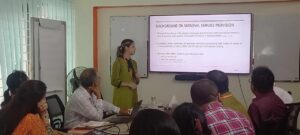
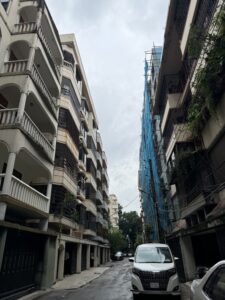

Part II:
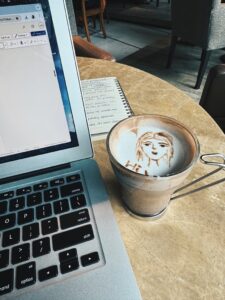

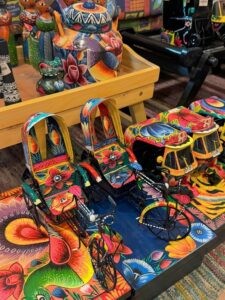
While my primary focus in Bangladesh was my summer practicum, I was also able to experience the culture, the sights, and the goodness of the Bangladeshi people. I was invited into homes for meals, coffee, chats, and experienced the absolute best fruit of my life (special shoutout to the mangos, pineapple, and lychee). At first, I was apprehensive to go outside alone because I was unfamiliar with the city and was briefed about my safety in Dhaka. However, once I finally got the courage, I found I was just fine. I became a “regular” at the nearby coffee shops and enjoyed visiting the local markets to look at all the different items and foods they offered. It was in these moments, at the coffee shops and markets, that I truly began to appreciate the subtleties of being human- a smile, a small gesture of acknowledgement. Despite my best efforts to become fluent in Bangla, there was often a slight language barrier. Yet, the gentleness and kindness of the people in Bangladesh is something I will never forget. These bonds and relationships are what made the next part of my experience so difficult.
Part III:
In early July, university students took to the streets in protest against a deeply flawed quota-based recruitment system for government positions. This system blatantly favored descendants of the 1971 liberation war, denying opportunities to qualified Bangladeshi students based on merit. Government jobs are highly coveted positions and this discriminatory policy created an impossible barrier for many. The protests, though initially peaceful, were met with a brutal response from the government. Instead of seeking peaceful dialogue, they unleashed violence, death, and hostility against their own people- their students, their future leaders. It was a heartbreaking betrayal of a country I had grown to love.
On the evening of July 18th, deafening silence. The government imposed a nationwide internet blackout. We were suddenly cut off from the outside world and the economy took a massive hit. People couldn’t pay their bills, add minutes to their phones, or even open their stores. Traditional media was heavily censored and my only source of information was the local newspaper or the hotel staff. Then things somehow got worse. A curfew was announced with “shoot-on-sight” orders. I felt fortunate to be in a hotel where my safety was a priority, but I couldn’t ignore the privilege that came with it. I struggled with my place in all of this. As an outsider, a foreigner, knowing I would eventually escape this tragedy, what was my role? I felt a mix of helplessness and rage. How could such violence be the response to students, like myself, making demands they had every right to make? The lack of humanity and empathy was overwhelming. It was a reminder of the fragility of freedom and the lengths some will go to silence individuals and maintain power.
I spent 24 hours inside a hotel for a week with no internet. I would go to the roof to see what was happening outside but it was quiet. No honking horns, minimal people, no street vendors- A stark contrast to the views I was used to seeing. I was able to get some text messages through and I joked with a fellow iPhone user about our texts being green. Jokes aside, it felt like we were living in a dystopia. There were foreign guests at my hotel and I watched as they left one by one. I was one of maybe 10 guests left. I had two weeks until I was supposed to go home. I wanted to stay, I wanted to see this through. I wanted to know my friends were safe. At the very least, I wanted to say goodbye to my Ipas team in person. So I waited. The Supreme Court did eventually reduce the quota for descendants of war veterans but at this point, it was not enough. Most of Bangladesh was fed up. They witnessed their friends and family being injured, or worse, killed, by their own government and associated parties. At this point, the movement was more than just quotas. It was a demand for freedom and justice.
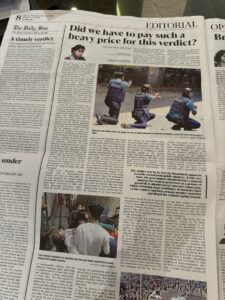
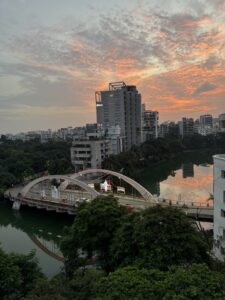
Part IV:
The internet slowly (emphasis on the SLOW) came back and I was able to return to the office for my last day. Things still felt eerie outside but I was thrilled to see my fellow Ipas team and say my “see-you-laters.” On August 2nd, I left Bangladesh. It was pouring rain and it felt somewhat symbolic. The rains were heavy, my heart was heavy but so full at the same time. The dichotomy of these emotions was something I was trying to accept.
I left Bangladesh having learned a multitude of things, some I did not anticipate. I was so incredibly inspired by the people of Bangladesh- a nation fighting for their rights at an unimaginable cost, yet emerging victorious. After I arrived home, many of my friends in Bangladesh reached out to inform me they had done it. They had overthrown their autocratic ruler.
So now, I can only hope for peace in the coming days for Bangladesh. I can only hope for a government that is built for the people, by the people. When I say, “it’s not the people but the systems that need development. The resilience of the Bangladeshi people is inspiring,” I mean it from the bottom of my heart. Their government system needed more than development, it needed complete transformation, and they knew it. The resilience and bravery of the Bangladeshi people will stay engraved in my heart forever. Until we meet again, Bangladesh. I am so proud.

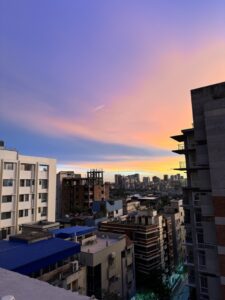
Other random mementos saved in my notes app:
“Everyone has their phone volume turned on. I know the ringtones by heart and oddly enough, I think I’ll miss it.”
“The honking of horns has become oddly therapeutic. The noise puts me to sleep at night.”
“The older I get, the more I’m learning just how much I appreciate human connection and the experience of being human. It’s powerful.”
“Every day I’m in a car, I’m surprised I’m not in an accident. The streets are wild but somehow, most people know what they’re doing.”
“It’s amazing what happens when people don’t have internet. The inability to live in reality, without distraction, seems impossible for some. I’ve come to appreciate it. It’s forced me to talk to folks here at my hotel that I may have not otherwise. It’s forced me to read that book I’ve been telling myself I’d start. It’s made me sit with my thoughts longer than I usually do. While circumstances for why this is happening are tragic, I’m trying to find an ounce of good in this reality we’re living in.”
Haylee
